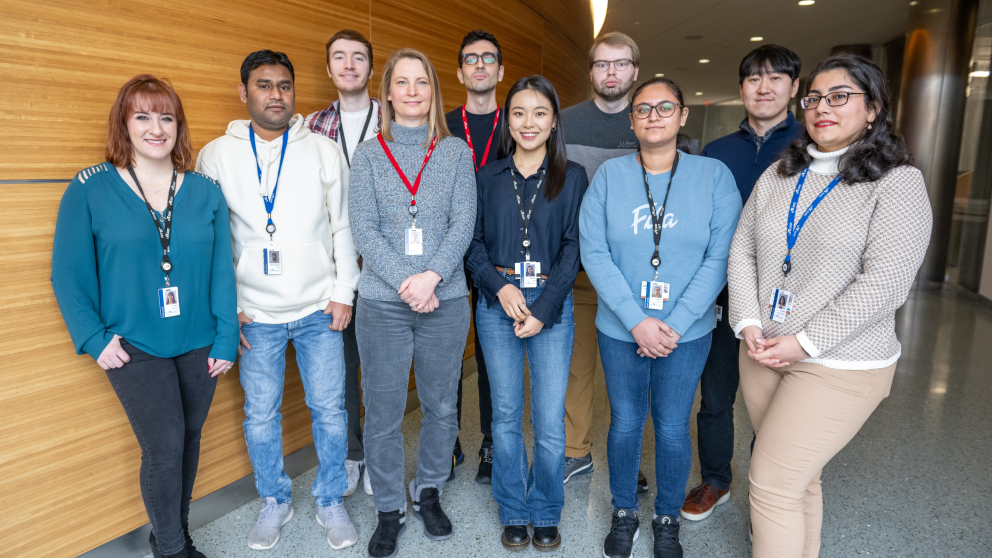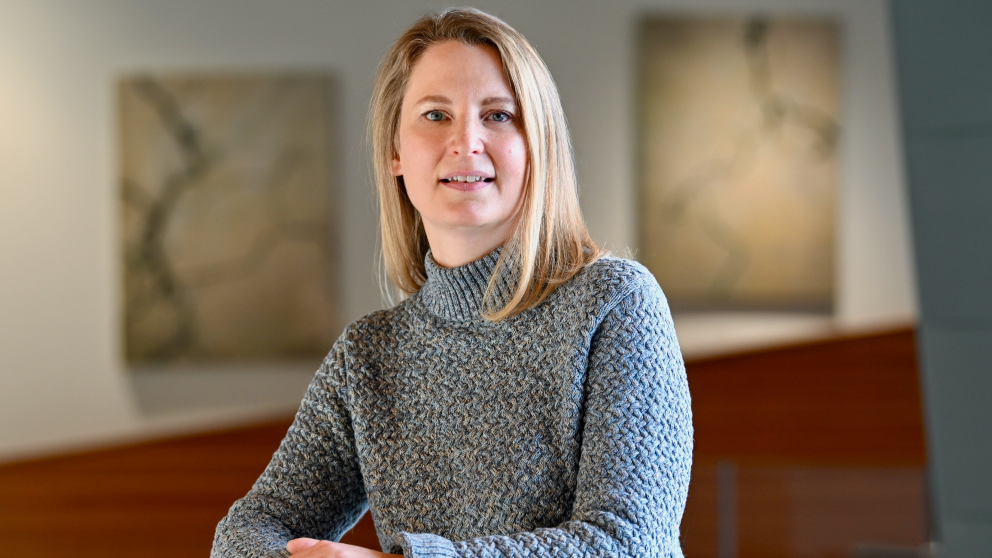 (l to r) Ashley Mrdelja, Md Naushad Khan, Blaine Pattavina, Silke Paust, Sayyed Hamed Shahoei, Haebeen Jung, Isaac Bell, Himani Sharma, Teha Kim, and Nooshin Nourbakhsh. Photo credit: Cloe Poisson
(l to r) Ashley Mrdelja, Md Naushad Khan, Blaine Pattavina, Silke Paust, Sayyed Hamed Shahoei, Haebeen Jung, Isaac Bell, Himani Sharma, Teha Kim, and Nooshin Nourbakhsh. Photo credit: Cloe Poisson
Professor Silke Paust, Ph.D., explores immunological memory in natural killer cells. Her work will change the way we view the immune system and equip it to defend against pathogens and disease.
Inheriting the scientist gene
As the daughter of two organic chemists, Silke Paust, Ph.D., always knew she would follow in her parents’ footsteps. Growing up with a scientific perspective interwoven throughout her daily routines allowed Paust to develop her inquisitive nature early in life. But, despite the frequency of scientific family discussions around the dinner table, it was not until her 10th-grade biology class that she recalls hearing about genetics.
“I remember feeling that it was unfair that one mutation can impact and challenge your quality of life,” says Paust. “It bothered me, and I was incessant with my questioning. My dad dropped me off at his work’s library where I could have access to scientific literature, which is where I found out about immune cells. It was then that I started to realize that sickness and health is a constant battle between pathogens and your own body’s reaction to clearing them.”
From then on, Paust was set on becoming an immunologist.
“I have never regretted my choice. Immunology is a young science. In this field, you are still mingling with the people who have and will make major discoveries. It is never boring,” says Paust.
Remember me?
Now as a professor at The Jackson Laboratory (JAX), Paust is committed to unraveling the mysteries of immune memory. It is common knowledge that vaccinations play a key part in stimulating the body’s immune memory cells, enabling a rapid and effective response against subsequent pathogen attacks. But, taking one step back, how does the immune cell remember the foreign invader or aberrant cell and then access that memory? That is the core question Paust intends to answer by deciphering the intricate mechanisms governing natural killer (NK) cells, a type of white blood cell that destroys infected and diseased cells.
Think of NK cells as one of the many types of foot soldiers deployed by the immune system to seek out hostile cells. From coronavirus to cancer, NK cells possess the unique capability of preventing widespread infection and disease by eliminating harmful cells in their early stages. Like their fellow T- and B-cell soldiers, NK cells seem to remember the pathogens they encounter. But what sets these soldiers apart is their ability to reside in “active-duty status” for decades. The Paust lab is interested in determining how the often-overlooked NK cells retain their “memory” of pathogen encounters throughout their long life span. Once they understand it, there is likely to be a way to hack the mechanism for therapeutic purposes.
 The Jackson Laboratory's Silke Paust. Photo credit: Cloe Poisson
The Jackson Laboratory's Silke Paust. Photo credit: Cloe Poisson
“You cannot be a memory cell if you are short-lived,” says Paust. “NK cells must be long-lived. My work will involve a variety of approaches at the molecular level, identifying what genes code for proteins responsible for seeing the pathogen, remembering the pathogen and maintaining the longevity of NK cells.”
Immunological memory is key, especially when it comes to vaccines. The main point of vaccination is to expose the body to a non-infectious piece of the pathogen so that it mounts an immune response to it. After that initial reaction, some of the immune cells (NK cells included) store that pathogen’s likeness, essentially creating a wanted poster for the pathogen. They are then able to use this as a reference when they encounter an invading pathogen again. Immune memory allows those cells to respond faster and more vigorously the second time they encounter a particular pathogen, which can be the difference between getting sick or having a fast and robust immune response. Paust plans to figure out exactly how NK cells “see” the pathogen and how they are able to remember it.
“We want to understand how we can teach the immune system to fight viral infection or tumors,” says Paust. “If we can figure out how to do this, we may be able to develop cures for a lot of different diseases.”
Collaboration at the core
What sets Paust apart is not only her drive for scientific discovery but also her approach to mentorship. Within her laboratory, personality, enthusiasm for science and self-motivation are valued as highly as technical expertise. She actively seeks individuals who are eager to expand their knowledge about the immune system, while proactively kick-starting their own careers and projects.
“Whether you want to become a successful investigator, patent lawyer or industry worker, expanding the horizons for all my postdoctoral associates, technicians and staff is a large part of my role. I thrive on seeing people learn, and this is one of the main reasons I came to JAX,” says Paust.
Collaboration is a cornerstone in Paust’s work. In the short time since her arrival, she has already established partnerships with various research groups within JAX, recognizing the power of collective knowledge in making significant scientific advancement. Currently working with Director and Single Cell Biology Lab Senior Research Scientist Elise Courtois, Ph.D., Assistant Professor Sasan Jalili, Ph.D., Professor Paul Robson, Ph.D., and Associate Professor Duygu Ucar, Ph.D., the Paust lab encourages others to engage with the team as they plan to serve as a hub for innovative ideas and novel endeavors in immunology research.
Beauty in the little things
Paust finds solace and inspiration in her role as a mother. Her four-year-old daughter serves as a daily reminder of the beauty in appreciating life’s small moments, a philosophy that resonates in her scientific pursuits. As she continues her journey as a member of JAX, Paust hopes to inspire a new generation of scientists, teaching them not only the intricacies of immunology but also the importance of fostering a supportive and inclusive scientific community.